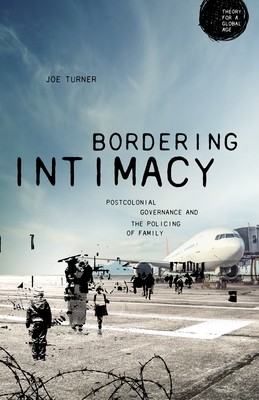
- We will send in 10–14 business days.
- Author: Joe Turner
- Publisher: Manchester University Press
- ISBN-10: 1526146967
- ISBN-13: 9781526146960
- Format: 14 x 21.6 x 1.9 cm, hardcover
- Language: English
- SAVE -10% with code: EXTRA
Reviews
Description
'Turner's book is both extraordinary scholarship and an unparalleled contribution at this critical juncture. It skilfully merges disparate areas of inquiry - imperial/colonial histories, intimate "family" relations, racial states, biosecurity regimes, migration/border politics - into an unprecedented but urgently needed "conversation" that illuminates crises of personal/national/global significance.'
V. Spike Peterson, Professor of International Relations, University of Arizona
They say that love has no borders. But in the twenty-first century, being in love, or more specifically having a family life, is increasingly done at the discretion of immigration regimes. This book explores the role played by the concept of 'family' in border control - where it came from and how it functions today.
Drawing on historical and contemporary cases, the book demonstrates how dominant forms of familial intimacy informed the development of borders under European empire. Employing postcolonial, decolonial and black feminist theory, it addresses contemporary concerns regarding the politics of borders, mobility and citizenship by situating these processes in histories of colonial racism and sexuality, from slavery to the present day. Struggles over who is recognisable as 'family' or who is capable of 'real love' continue to structure attitudes to belonging, control and even life and death. As the book shows, Eurocentric conceptions of 'family' are bound up with the reproduction of colonial power.
Bordering intimacy will appeal to anyone engaged with the ongoing legacies of colonial power and race. It contributes to key public and scholarly debates on mobility and borders across international sociology, politics, international relations and political geography.
EXTRA 10 % discount with code: EXTRA
The promotion ends in 18d.16:29:42
The discount code is valid when purchasing from 10 €. Discounts do not stack.
- Author: Joe Turner
- Publisher: Manchester University Press
- ISBN-10: 1526146967
- ISBN-13: 9781526146960
- Format: 14 x 21.6 x 1.9 cm, hardcover
- Language: English English
'Turner's book is both extraordinary scholarship and an unparalleled contribution at this critical juncture. It skilfully merges disparate areas of inquiry - imperial/colonial histories, intimate "family" relations, racial states, biosecurity regimes, migration/border politics - into an unprecedented but urgently needed "conversation" that illuminates crises of personal/national/global significance.'
V. Spike Peterson, Professor of International Relations, University of Arizona
They say that love has no borders. But in the twenty-first century, being in love, or more specifically having a family life, is increasingly done at the discretion of immigration regimes. This book explores the role played by the concept of 'family' in border control - where it came from and how it functions today.
Drawing on historical and contemporary cases, the book demonstrates how dominant forms of familial intimacy informed the development of borders under European empire. Employing postcolonial, decolonial and black feminist theory, it addresses contemporary concerns regarding the politics of borders, mobility and citizenship by situating these processes in histories of colonial racism and sexuality, from slavery to the present day. Struggles over who is recognisable as 'family' or who is capable of 'real love' continue to structure attitudes to belonging, control and even life and death. As the book shows, Eurocentric conceptions of 'family' are bound up with the reproduction of colonial power.
Bordering intimacy will appeal to anyone engaged with the ongoing legacies of colonial power and race. It contributes to key public and scholarly debates on mobility and borders across international sociology, politics, international relations and political geography.


Reviews